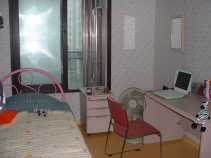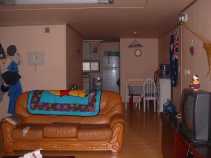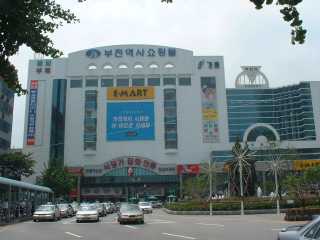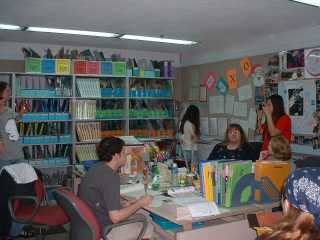
My bedroom in Korea.

The living room, with the kitchen behind it.

compared to my eensy studio in New Caledonia.

Annyeonghaseyo!
First, a little history....)
As soon as I got back to New Zealand from New Caledonia, I started looking through the situations vacant and noticed an interesting number of ads for someone to teach English in Japan or in Korea. I tried out for a Japanese programme, but they didn't want me; I got a job for a few months in a call centre; I decided I didn't want to go overseas for so long again; I applied for a bundle of jobs in New Zealand and got rejected for them all; and finally I sighed and e-mailed the people organising two of the Korean programmes.
The second response I received unimpressed me quite a bit; the first, however, sent a heap of information and pointed me to their quite comprehensive website. This was the Sogang Language Program, and I sent them my full CV on the 6th June. On the 8th, they phoned me to see if I was okay for a phone interview; I answered in the affirmative and the interview was an hour later. The next day I was e-mailed a contract and told that if I agreed with it, the director of the school wanted me by the end of June.
I probably choked, or something like that. Especially because my father had just come up with a couple of cheap places on a trip to Fiordland for me and my sister; this gave me a little under two weeks to tie up my affairs in New Zealand (eg cancelling my unemployment benefit and my health insurance, doing my taxes, visiting friends) and to prepare for travelling overseas (eg getting some money, travel insurance, vaccinations, lonely planet guides, teach yourself Korean books, panicking somewhat...) I managed (sort of) and pulled an allnighter on the final night to tidy my room, read some Bujold books that I'd just found in the library, and pack.
My plane tickets had arrived the day before I left; my stopover in Auckland was the time fixed for getting my visa. Somehow, all went well. I slept for most of the plane trip, waking up only for meals and drinks.
Fri, 29 June 2001
We landed at Incheon, the Seoul airport; I collected my luggage, was waved through customs, and was met by Mr Im, who drove me to my apartment. There I met my two flatmates Michelle from Australia and Glenda from Canada (who was very happy that I knew where New Foundland was) and started settling in, starting with a much-needed shower. :-)
It is, completely by the way, the start of monsoon season, and it's raining cats and dogs, with the promise of even larger mammals to come. It's kind of odd out there: all the road signs, all the car license plates, are in Korean letters. There's absolutely no forgetting that it's a foreign country.
My bedroom's great, about as big as what I have at home, or (to put it another way) about as big as my New Caledonian bedroom+lounge+kitchen. There's also the other teachers' bedrooms, a spare bedroom, kitchen, lounge, bathroom, laundry room and verandah. The other good thing is that there's an actual sense of aesthetics here: wallpaper with patterns, and there's a pattern on my wardrobe, and a nice cover on my bed.
My flatmates are Michelle from Australia, and Glenda from New Foundland, Canada. Alas, they're both smokers. They seem quite good at going onto the verandah to smoke, but it does still drift into the lounge. Glenda's been here since January; Michelle's been for a year but has signed on for another few months.

My bedroom in Korea. |

The living room, with the kitchen behind it. |

compared to my eensy studio in New Caledonia. |
In the afternoon I went into school -- took a taxi there as it was raining, and taxis are dirt cheap and the school's close; it costs just 1300won (NZ$2.60, US$1.) Met the other teachers, and they're all totally crazy. :-) Running around chasing each other, that sort of thing. Looks like it could get overwhelming, but should be fun. I had bulgogi for lunch, which was lovely. It's one of the more famous dishes, basically beef stew, but... it's all in the preparation. I ate with chopsticks, rather clumsily, especially when it came to the noodles! Only I'm slightly nervous that Glenda's said that they order something for lunch every day there; I really would prefer to cook or scrape something together. Ordering something every day works out to about a month's salary over the whole year, which is not really for me; and especially until I get paid I've only got a limited amount of cash -- and credit cards are quite uncommon here, and...
But all the teachers are nice, it's a very relaxed place and it looks like I'd've done better to bring more t-shirts and fewer suits for the classes. Next week I'm observing, the week after I'll start with a limited number of classes.
Sat, 30 June 2001
Michelle took me to the supermarket, and I got the phone cord I needed for the modem. (For a mere 2000won, about NZ$4 or US$1.50.) I practised my Korean by asking for the plug adaptor I need for my other appliances, but they didn't seem to have it. I also tried at the big department store across the road; they gave me some long explanation of something, which I didn't understand so took that for a 'no'; so I said "thank you", being the only other thing I can say. :-)
There's a radio in my room, so have been listening to a Korean station to get the sounds in my head. Also watching movies with Korean subtitles to practise my reading. (My current language goal is to learn the horrid numbers; so far I have up to 'six'.) The only English channel is the "American Forces Network" and all its ads are aimed at the military forces here. They have the stupidest, most unimaginative, and most hilarious ads, warning people to lock the door to their quarters even though they're in camp to avoid being stolen from, and saying that someone who makes excess copies of documents and frequently visits foreign embassies might be guilty of espionage, etc. But Glenda says it gets annoying after a while as none of them are terribly creative ads.
Continue reading my diary for:
Or read random (incomplete) notes I've made about Bucheon, the cost of living, the language, or working at SLP.
20km west of Seoul, and east of the airport. It's very loud and busy. Right here, near the town hall (though I don't think it's really near the town centre) there are blocks and blocks of apartment buildings, all with the name of the block and the number of the building on their sides. These blocks of buildings are raised very quickly to deal with a lack of housing; Michelle tells of seeing one commercial go up in a few months. Bucheon's a very industrial and growing city.
Some things are very cheap, like electronics and CDs and cybercafes (that latter is cheaper than the cost of the phone bill would be, per hour, but I need the 'net on my computer, and cybercafes don't do that). Some's quite reasonable -- some of the food in the supermarket, frex, but then some's expensive or not even there, like cheese. They don't have any decent cheese, just those plastic-wrapped plastic-like slices. I think they had a couple of French cheeses, but there's no decent everyday stuff you can use for cooking or for random nibbling on, like a block of tasty cheddar. But then meat is not nearly as horrendously overpriced as it was in New Caledonia, so it works out. Fruit's slightly more expensive than in New Zealand, but not bad; only it's priced per 100grams instead of per kilo, which always confuses me.
Fruit got more expensive at different times of the year, of course. Cheese eventually arrived, thanks to Walmart. I never found decent peas -- they were always dry and sandy -- until Carrefour sold them in the pod. Not cheap, nor easy.
Korean writing is logical. It was invented back when literacy was very low precisely because they had to use Chinese characters. There is a square for each syllable, and within each square are the symbols for each sound. For the syllable "han", for example, there's the symbol for 'h', next to it is the symbol for 'a', and below them is the symbol for 'n'. What's more the symbols 'g, k, ng' are similar, and similar in the same way as the symbols 'b, p, m' and 'd, t, n', among other patterns. This makes it very easy to learn.
We work from about 3pm to 9pm (plus some of us have morning, preschool, classes). In the middle of the evening, SLP provides us with a snack of some sort; very good, as we have no dinner break.
The staffroom is full of books and files of worksheets and old lesson plans, which is a huge difference from New Caledonia where we had nothing. But the place is also very very fun. We work on the syllabi and preparing classes and stuff, but we're always distracted by talking about someone's breasts, or the elimination challenge for our own version of "Survivor", or some random (very physical but playful) fight between Michelle and MiHyun -- usually them, but others get drawn in too. Among other things. Then the bell rings and the students peek in the door and we go off to class.

The staffroom at SLP. At the left, Michelle's posing for MiHyun near the right; Bev with the glasses is looking at me; Nagille is right under MiHyun's elbow, Jamie is the guy, and Glenda is the head and scarf at the bottom right. Note all the resources lining the shelves and walls.
We have a structure for each class: first we start with greetings, asking the students how they are and what they've been doing. Then there's the main lesson, where we teach from the book (not a dry textbook, a fun one full of pictures and stuff). That takes up the first 40min / one hour; then we swap teachers and do the follow-up, usually worksheets or something, and the close, usually a game. They get rewarded with stars and punished with an 'x'. They also get candy and other rewards for various things -- attendance, homework; lots of this I haven't sorted out yet, and I'm not giving enough stars.
There are about ten students in a class, and each class is an hour twenty long for the Mon/Wed/Fri sessions, but two hours for the Tue/Thur sessions. But we swap in the middle of the class with another teacher, and take over that teacher's class instead. The youngest students are quite adorable; they'll often turn up at the door to the staffroom calling "Teacher, Teacher!" and insisting on carrying Teacher's books into the classroom.
In the class itself, they can get rowdy, but they can also be very cute about it. This depends on the class; I've got quite a range. My first couple on Mon/Wed/Fri consist in the main of ten rugrats clutching my sleeve with a "Teacher, Teach*errrr*! 'Apple' spelling!" Then I've got some more average classes, where they're old enough to be quiet, but young enough to have fun. Then to finish, I've got some middle school classes who tend not to be rowdy so much as completely silent; not unlike some of my classes in New Caledonia. You ask them a question and they sit there blankly, too shy to answer; if they answer at all it's short and whispered.
Back to travel page.
Back to main page.
Email me.